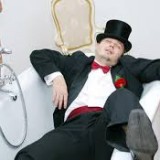Drunken push leads to over $1/2 million award.
In a stark example of the profound consequences that can come from a modest confrontation, on September 30, 2015 the BC Supreme Court ordered damages of $553,000 to be paid, after an intoxicated groom to be pushed a man that was teasing him.
In Robinson v. Bud’s Bar Inc., 2015 BCSC 1767, the defendant, a groom to be who was “exotically dressed and wearing a ball and chain” following a bachelor party, was approached by the plaintiff and teased about his upcoming marriage. Both parties were intoxicated. The defendant responded by pushing the plaintiff who fell down, struck his head on the ground, and suffered a permanent brain injury.
The Court assessed damages at $790,000 but then reduced these by 30% for the plaintiff’s contributory negligence and provocation. In reaching this split of fault Mr. Justice Sigurdson provided the following reasons:
[140] I find on the evidence that both men were intoxicated. I find that the plaintiff came up to the defendant Leelund Turner and teased him and persisted to do so despite being told to leave and being asked by his friend or friends to get going. I do not conclude that the defendant Leelund Turner held the plaintiff before pushing him as counsel suggested. I find the plaintiff had a reasonable opportunity to extricate himself from the situation. The plaintiff could easily have walked away but the plaintiff persisted to tease Leelund Turner. The push was sudden and careless but it followed the Leelund Turner’s plea to Mr. Robinson to leave him alone.
[141] I find that in these particular circumstances the defendant Leelund Turner has satisfied me that the plaintiff was both contributorily negligent and provoked the negligent push. In these particular circumstances the concepts overlap to a degree. While I recognize that alcohol consumption is not itself negligence, here I find that the plaintiff was intoxicated to the extent that he persisted to be rude to the defendant Leelund Turner in close quarters despite being told to back away by Leelund Turner and being told by his friend that he should leave. I find that for Mr. Robinson to persist as he did to tease the defendant Leelund Turner at close quarters, he was partly at fault for the injury.
[142] I think that the conduct of the plaintiff also amounted to provocation. While the plaintiff’s counsel says that the conduct does not meet the definition of provocation, I think in the circumstances of this case that it can easily be inferred from the evidence that the persistence of the plaintiff at close quarters that was rude and aggressive caused the defendant Leelund Turner to momentarily lose his power of self control and push the plaintiff abruptly, forcibly and carelessly away, resulting in the fall.
[143] While I do not find that the defendant Leelund Turner has proven that had Mr. Robinson not been intoxicated, the drastic results of the fall would have been avoided, I think that Mr. Robinson must bear some responsibility because of his fault in approaching the defendant Leelund Turner and persistently teasing him at close quarters.
[144] Accordingly although I find the defendant Leelund Turner liable, I find that both contributory negligence and provocation have been proven by the defendant Leelund Turner and that the damages incurred by the plaintiff as a result of the defendant’s negligence must be reduced by 30%.




